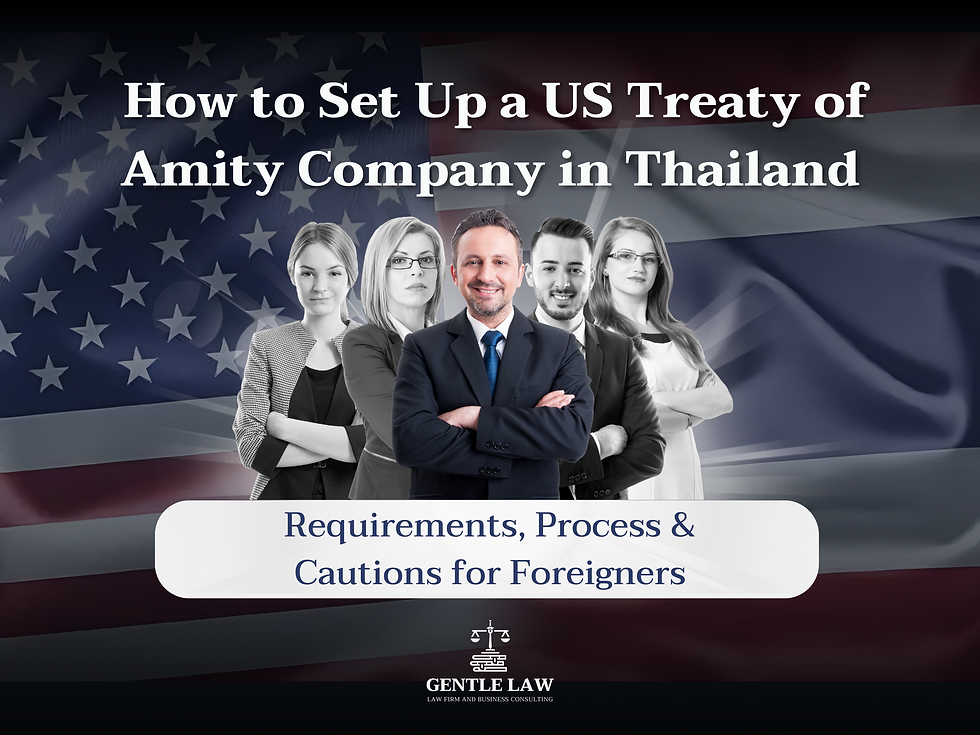How to Set Up a US Treaty of Amity Company in Thailand: Requirements, Process & Cautions for Foreigners
- gentlelawlawfirm
- May 29, 2025
- 3 min read
Updated: Jul 13, 2025

Why the US Treaty of Amity Matters for American Entrepreneurs in Thailand
For American business owners looking to enter the Thai market, the US-Thailand Treaty of Amity and Economic Relations offers a rare advantage: the ability to establish a company in Thailand with 100% U.S. ownership in most sectors—without needing a Thai partner.
While this treaty bypasses Thailand’s typical foreign ownership restrictions under the Foreign Business Act (FBA), many entrepreneurs misunderstand its scope, process, and limitations. This article will help American nationals understand what it takes to establish a Treaty of Amity company, the key documents involved, and important risks to consider before launching.
What Is the US-Thailand Treaty of Amity?
Signed in 1966, the Treaty of Amity and Economic Relations between the Kingdom of Thailand and the United States of America allows U.S. citizens and U.S.-majority-owned companies to:
Own up to 100% of a business in Thailand,
Receive national treatment, i.e., be treated similarly to Thai nationals in business operations,
Be exempt from most restrictions under Thailand’s Foreign Business Act B.E. 2542 (1999).
Key Limitations:
However, this privilege is not blanket and does not extend to all sectors. Restrictions still apply in areas such as:
Communications
Transportation (except inland shipping)
Agriculture
Land trading
Exploitation of natural resources
Businesses in these restricted fields must still comply with Thai laws or seek special licenses.
Treaty of Amity Company Formation: Step-by-Step
To legally operate as a U.S.-owned company under the treaty, you must follow these core steps:
Step 1: Company Registration with the DBD (Department of Business Development)
Register a Thai limited company with at least 51% of shares held by U.S. citizens or U.S. entities.
Minimum of three shareholders required.
Appoint at least one U.S. director with signing authority.
Step 2: Certification from the U.S. Commercial Service in Bangkok
Submit the following:
Shareholding structure
Company affidavit
Passports/Corporate documents for U.S. shareholders
Signed letter requesting certification
The U.S. Commercial Service will verify whether the company is at least 50% American-owned and controlled.
Step 3: Apply for Foreign Business Certificate (FBC)
Submit to the Thai Ministry of Commerce:
Certified documents from the U.S. Commercial Service
Company affidavit
Shareholder list
Business plan and scope of activities
Passport copies of directors
Processing time: Approximately 4–6 weeks
Once the Foreign Business Certificate is granted, your company is officially protected under the Treaty.
Required Documents: What You’ll Need to Prepare
Document | Issuing Entity | Notes |
Company Affidavit | DBD | Within 3 months of issuance |
List of Shareholders | DBD | Certified |
Articles of Association & Memorandum of Association | DBD | English translation may be requested |
Passport copies | U.S. shareholders & directors | Must be valid |
Certification Request Letter | Company | Addressed to U.S. Commercial Service |
Proof of U.S. Shareholder Identity | Individuals or Corporate | Articles of incorporation for U.S. companies |
Business Plan | Company | Detailed, including staffing and revenue projections |
Practical Risks and Precautions for American Founders
Setting up under the Treaty of Amity comes with clear benefits—but it's not without legal and operational complexity. Here are 5 critical issues to consider:
1. Not All Business Activities Are Covered
Just because your company is 100% U.S.-owned doesn’t mean you’re automatically allowed to engage in any sector. Activities like retail, services, or consultancy must be carefully matched against permitted fields.
2. Immigration and Work Permits Are Separate
Treaty status does not grant automatic Non-B visa or Work Permit rights. You must still meet Thai immigration and labor law criteria.
3. U.S. Control Must Be Genuine
Nominee structures (i.e., using American shareholders in name only) are illegal and can lead to revocation of certificates and criminal penalties.
4. Changes in Shareholding Must Be Reported
If ownership drops below 50% U.S., you may lose Treaty protection, and your company will be considered “foreign” under Thai law.
5. Regulatory Reviews Can Be Strict
Thai authorities may scrutinize your application, particularly the authenticity of U.S. control. Supporting documentation should be airtight and consistent.
Conclusion: Treaty of Amity Is a Privilege—Use It Wisely
For American entrepreneurs seeking direct access to Thailand’s economy, the US-Thailand Treaty of Amity offers a powerful legal pathway to full ownership and long-term presence. However, the process is highly regulated, and each step must be executed with care and legal compliance.
If you're unsure about your eligibility, activities, or documentation, consult a legal professional familiar with Thai business laws and U.S. treaty protections.
Need help setting up a Treaty of Amity company? Contact GENTLE LAW IBL for professional assistance in registration, certification, and compliance. Our international business law experts make your entry into Thailand efficient, legal, and secure.
TAG : Non B Visa



